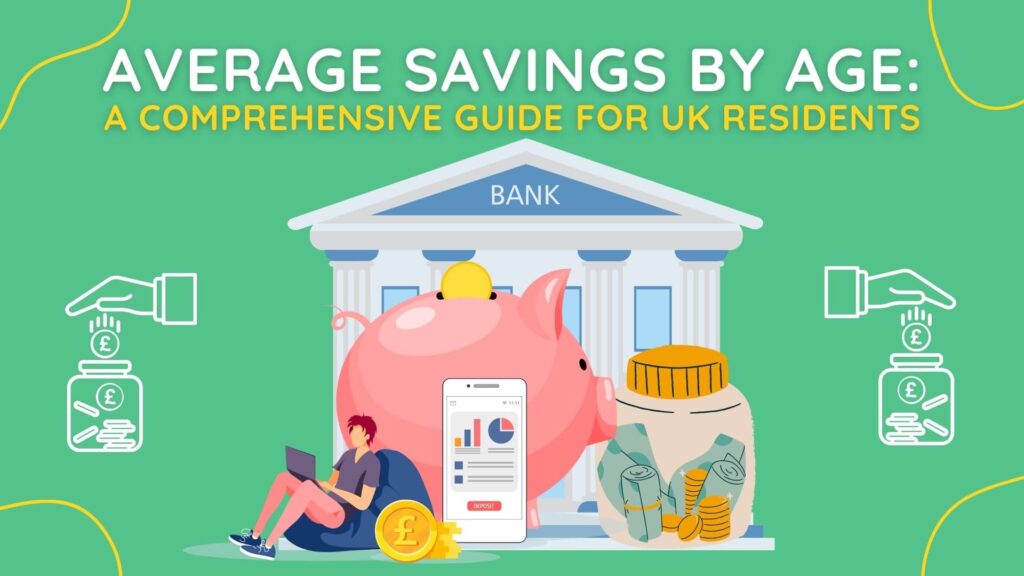
Sammie Ellard-King
I’m Sammie, a money expert and business owner passionate about helping you take control of your wallet. My mission with Up the Gains is to create a safe space to help improve your finances, cut your costs and make you feel good while doing it.

Quickfire Roundup:
The general takeaway from the national statistics data available is that those who are older have more, on average, in savings. When you consider those aged 18 to 24, they have managed to put away £2,481.
Those aged over 65 have had longer to save money and find themselves with an average of £113,600.
Average UK savings are also impacted by employment status and a host of other factors. Perhaps unsurprisingly, it’s the employed that have the highest average household savings.
When looking at average savings by age in the UK, stark differences are shown via savings statistics.
The older generation has more savings, and this is possibly down to the fact that they have had that much longer to add to their accounts as they prepare for retirement age.
Retirement is one reason that makes having a saving habit so important, but there are other reasons why UK households save. It adds peace of mind, knowing that there is an emergency fund to fall back on should things go wrong.
It also helps for those times when rising living costs become a challenge. Ultimately though, saving allows you to create the best financial situation possible and sets you up for a secure future.
As you read on, I’m going to be taking a closer look at the average savings by age groups.
I’ll be sharing which age group has the most savings, where they put their monthly savings and the other factors that affect how much UK adults save.
Table of Contents
Average savings by age in the UK
The average amount of savings in the UK differs vastly based on age group. According to savings statistics from the ONS, this is how each age group fairs:
| 18 to 24-year-olds | £2,481 |
| 25 to 34-year-olds | £3,544 |
| 35 to 44-year-olds | £5,995 |
| 45 to 54-year-olds | £11, 013 |
| 55 to 64-year-olds | £20,028 |
| 65 to 74-year-olds | £113,600 |
As you can see, the highest average savings can be found in the older generation.
There are numerous reasons why younger age groups will have saved less such as having had less time to add to savings accounts, being paid lower wages and repaying student loans. Generally, younger people will have higher living expenses too.
The same UK savings statistics also reveal that the average British adult, regardless of age, has managed to save £6,757.
The worrying thing here is that, when you go back to looking at age groups, a whopping 40% have no savings at all. This differs significantly from those over 55, where only 2.23% are without savings.
The figures factor in what people have in their current and savings accounts as well as both ISA types, cash ISAs and stocks and shares ISAs, also the likes of national savings bonds.
If you’re interested in using technology to help you save check out our best money-saving apps below.
Let the latest technology help get you there with the best money savings apps.
Factors that affect savings in the UK
While average savings by age are one consideration, other factors come into play that affects UK average savings. These include:
Employment status
Whether you are unemployed, employed or self-employed has an impact on how much you save. As it stands, it’s employed people that have the highest average savings.
Much of this is driven by the fact that it is now a legal requirement to offer a work-based pension scheme. Putting money into a pension as a worker sees monthly employer pension contributions being added which sees the value increase.
Research from the Institute for Fiscal Studies highlights how few self-employed people pay into a pension scheme. This figure falls even lower when looking at those who have been self-employed for less than 5 years.
While self-employed people can enjoy a significant annual income, the problem is that earnings can be volatile. This can make it difficult to save money compared to employees with regular income regularly.

Level of income
Average UK savings are also impacted by the amount that you earn. It makes sense that the more that you earn, the more disposable income you have and the more savings you have.
This translates to high income families having significant amounts saved when compared to low income families.
The average UK salary is currently around £32,000 and this is even higher in the capital with the average London salary at 37k.
One example of how much savings people have according to income can be seen by looking at ISAs. Research shows that the median figure wage-wise when it comes to those who hold ISAs is between £20,000 and £29,999.
Those in this band tend to have ISAs with a value of £21,996. There are fewer people in higher income brackets that have ISAs purely down to the fact that fewer people earn higher amounts.
However, those that earn £150,000 or more have ISAs that are worth almost £75,000.
Level of education
Those with higher levels of education are better at saving money than those who don’t progress beyond basic schooling.
This could be down to the fact that graduates tend to earn more so they have higher levels of disposable income.
These higher levels of financial wealth allow people access to preferential interest rates by opening savings accounts that come with favourable terms.
Marital status

UK households save more when married. This can be explained in a couple of ways:
- Marriage is a commitment for life and so people start to plan further ahead. This means planning for things such as retirement savings and having a healthy savings account to assist with a growing family and other future plans
- Average UK savings increase with marriage as there are then 2 incomes to play with. With a combined monthly income, there s the opportunity to put more aside and to also explore other financial assets
Gender and average UK savings amount
The impact of gender on average savings is affected by age. When looking at younger age groups, it is females who save more.
That changes as people get older and, when we reach the latter age groups it’s males who have the most savings.
This can be explained in a couple of ways:
- Men will generally work more years than women if they are in a relationship and have children. While men can, of course, take time away from work for childcare, it is still more often women who take career breaks. This means that men have longer to make contributions to retirement funds
- There is still a gender pay gap in the UK. As we have already seen, there is a correlation between income and UK average savings. If men are earning more over time, it makes sense that they are able to save more.
Tips for saving money
Average savings by age are just that: an average.
There are steps that you can take to boost your net financial wealth and open up the opportunity to save more than is typical for your age group.
Here’s a look at how:
Set financial goals
If you want healthy savings accounts that go above the UK average, you need to set goals and know where you’re heading.
Have a plan and know how much money you need for things like your retirement income, emergency fund and other future plans.
When you know where you trying to get to, you can calculate how much savings you need.
Create a budget
If you want to increase your monthly savings and go beyond the average amount, a solid household budget is a must. Plan for your monthly income and commit to an amount that you will save.
Understand your living expenses and trim back if necessary. If you stick to your budget, you should find that your disposable income increases and you put this into a savings account, stocks and shares ISAs or cash ISAs.
If you want to try and increase your household savings by budgeting, these are the steps that you’ll need to take:
- Understand what your net monthly income is
- Have a why in mind when it comes to setting your budget
- Be able to differentiate between fixed expenses and those that vary from month to month
- Pay down debt as a priority
- Recognise your other priority payments such as mortgage/rent and council tax
- Track your spending and see where you can save
Let the latest technology help get you there with the best money savings apps.
Boost your income
While average savings by age are important, we have also seen how high income families are able to save more than the average person.
By boosting your income, you can increase your net wealth and have more to save. You could increase your income by:
- Approaching your employer for a pay rise
- Looking for a higher paid job
- Exploring passive income opportunities
- Starting a side hustle
Make the most of saving and investment tools
Technology has made it easier than ever for the average person to take control of their savings. You can boost yourself beyond the average savings amount by taking advantage of these.
You should certainly take the time to explore the rise of Fintech banks. These include the likes of:
- Monzo
- Starling
- Revolut
These banks make it easier to keep track of your spending and help you to increase the amount of money saved each month. They do this in a few ways, depending on who you sign up with:
- These banks help you to categorise spending so you can see exactly where your money goes
- Some round up your spending and place the extra into a savings pot. A pot is just another name for a savings account and you can create several of these for different purposes
- You will find that some of these accounts also offer cashback when you use your card for purchases
- They offer current and savings accounts, as well as business accounts, with competitive interest rates
If you want to boost average savings through investments, there are plenty of apps that now make this easy.
Whereas stocks and shares were once there for the extremely wealthy, now they are accessible to all.
Some of the best apps to explore include:
What you’ll find with these apps is that they make investing easy for the average person. If you’re not sure where to invest, some of these platforms include robo-advisors.
After gauging your attitude to risk, these robo-advisors are able to manage your portfolio and invest according to your goals.
FAQs
How much should I have saved by the time I'm in my 30s?
While savings accounts may not seem like a priority, and while retirement age seems miles away average savings matter in your 30s.
Figures show that those in their 30s tend to have anywhere between £3,000 and £6,000 in savings accounts.
However, that may not be enough. It suggests that those in this age group need to have enough savings to cover 6 months’ worth of their living expenses.
How many British adults have no savings at all?
Average savings figures are skewed by the fact that a large proportion of adults have no savings at all. Saving statistics show that 34% of adults in the UK either have no savings at all or have less than £1,000.
This means that over 22 million people have nothing in place for retirement savings and have no emergency fund to fall back on.
What should I do with a lump sum?
If you’re fortunate enough to have a lump sum, you can use this to substantially increase your net financial wealth.
You could use it to pay down debt or you could invest in the likes of stocks and shares ISAs.
You could also explore funds from providers such as Hargreaves Lansdown. Investing here has the potential to see you benefit from compound interest and boost your net worth.
Final thoughts on average savings by age in the UK
It’s clear that age has an impact on how much people have in their savings accounts. Generally, the older the person the more they will have. However, there are other factors to consider too such as income levels, education and even marital status.
While age group may have an impact when it comes to average savings, the good news is that you don’t have to be average. You can take steps to boost your income as well as budgeting so that you can save more.
If you want to learn more about savings, and how to take control of your money, there are plenty of resources at Up the Gains that can help.
It’s also worth furthering your education with financial books such as Rich Dad Poor Dad by Robert Kiyosaki, I Will Teach You To Be Rich by Ramit Sethi and Start Your FIRE by Dylan Redling and Allison Tom.
More Like This
Share on social media
Disclaimer: Content on this page is for informational purposes and does not constitute financial advice. Always do your own research before making a financially related decision.




